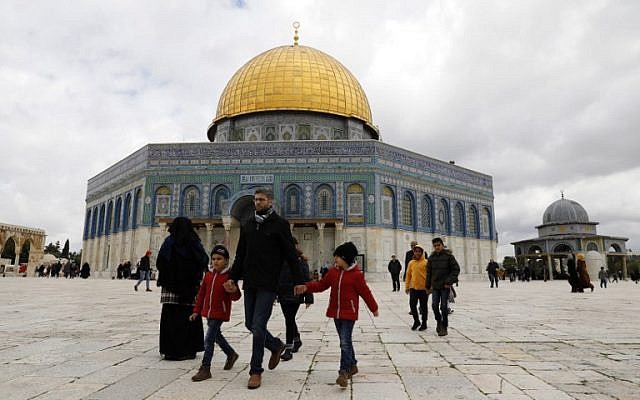JORDAN – The king frowns: Complexities of Israeli-Jordanian relations
March 21, 2019
JERUSALEM POST – Last Thursday, 500 Jordanians suddenly became employed when Israel and Jordan expanded an agreement allowing Jordanian citizens to work in Eilat hotels. The agreement also includes sleeping arrangements and commuting arrangements as the Jordanians are meant to enter Israel in the morning and return to Jordan in the evening, the deal will provide the Jordanian kingdom millions of dinars annually and thousands of job applications made their ways to the relevant job agencies.
The agreement, which largely went unreported, is one more example of the complexities of the Israeli-Jordanian peace agreement now marking its 25th year. On the one hand, the two countries are engaged in intense security cooperation, which is done behind closed doors, on the other hand, tensions and suspicions are increasing. On the same day the tourism visas were expanded envoy to Prime Minister Benjamin Netanyahu, Meir Ben-Shabbat attempted to reach an agreement regarding recent tensions on Temple Mount and returned empty-handed.
Tzofar in southern Israel, halfway between Eilat and Rabat Amon, now faces the question of what is to happen to their agriculture lands.When the Israeli-Jordanian peace agreement was signed the then-king of Jordan agreed the lands will go on being cultivated by the Israelis despite being Jordanian lands for a period of 25 years, the time is now up and the Jordanians intend to annex their lands now.
The 30 families which reside in Tzofar live off these lands and export millions of dollars' worth of crops to the world as well as to the Israeli market. Shortly after Passover, unless a compromise is reached, the families will have to decide if they mean to begin cultivating the lands facing the uncertainty of being able to reap what they sow.
There were voices in Israel who called on the Netanyahu administration to end water sharing with the Jordanians as a reaction to the move, but the water Israel hands over to Jordan is part of a legally binding obligation within the peace deal and the clause about the Tzofar lands was set for a 25-year period when the peace agreement was signed. The Jordanian decision was not a surprise as officials in Jordan gave Israel warnings for more than a year in advance that the move was coming. It followed two incidents that Jordan viewed as problematic, the warm reception Prime Minister Benjamin Netanyahu gave the Israeli security guard who shot a Jordanian citizen in 2017, and Israel pulling out of a water desalination project which was meant to spare the Jordanian the cost of building a water pipe from Aqaba to Rabat Amon. Jordanian claims that the project is vital fell on deaf ears.
Please go to The Ugly Truth to read the entire article.
________
Listen to this discussion about Jordon's King Abdullah II bin Al-Hussein as to his position related to Jared Kushner's peace plan for Palestine and Israel. People do not realize Jordon is a custodian of holy sites in Israel. Jordon and King Abdullah's responsibility as custodian of the holy sites in Israel is too prevent the Judaization of these sites.
Jordan's king says Amman preventing 'Judaization' of holy sites in Jerusalem
Hashemite Red Line: King Abdullah Issues Dire Warning over Jerusalem's Holy Sites
Watch the King of Jordan participate in a military exercise with his armed forces
Source: The Times of Israel
Jordanian king says pressured to alter custodianship of Jerusalem holy sites
21 March 2019 | By AP and TOI staff
King Abdullah vows to not change his country's historic role as guardian, doesn't reveal details of who is squeezing him
Palestinian Muslim worshipers walk past the Dome of the Rock mosque, situated in the al-Aqsa compound on the Temple Mount in Jerusalem's Old City, March 1, 2019, before Friday noon prayers. (Ahmad Gharabli/AFP)
ZARQA, Jordan — Jordan's King Abdullah II has vowed to keep protecting Islamic and Christian holy sites in Jerusalem, calling it a "red line" for his country.
Abdullah said Wednesday, during a visit to the Zarqa Governorate outside Amman, that he’s under pressure to alter his country's historic role as custodian of the Jerusalem holy sites, but that he won’t change his position.
"I will never change my position toward Jerusalem in my life," Abdullah said. “All my people are with me."
He did not specify what kind of pressure he was encountering.
The Waqf, a Jordanian-appointed council oversees Muslim holy sites in Jerusalem. It claims exclusive authority over the Temple Mount compound and says it is not subject to Israeli jurisdiction. Tensions often escalate at the site.
Please go to The Times of Israel to read the entire article.
________
Exclusive interview: Jordan's Prince Hassan Bin Talal visits NZ to honour Christchurch fallen
Related:
FLASHBACK – Jordan to abandon part of 1994 peace treaty with Israel on land lease; Israel calls Jordanian reclamation of leased farmland 'unacceptable & disruptive'
Jordan will continue protecting holy sites in Jerusalem — King


No comments:
Post a Comment
Note: Only a member of this blog may post a comment.